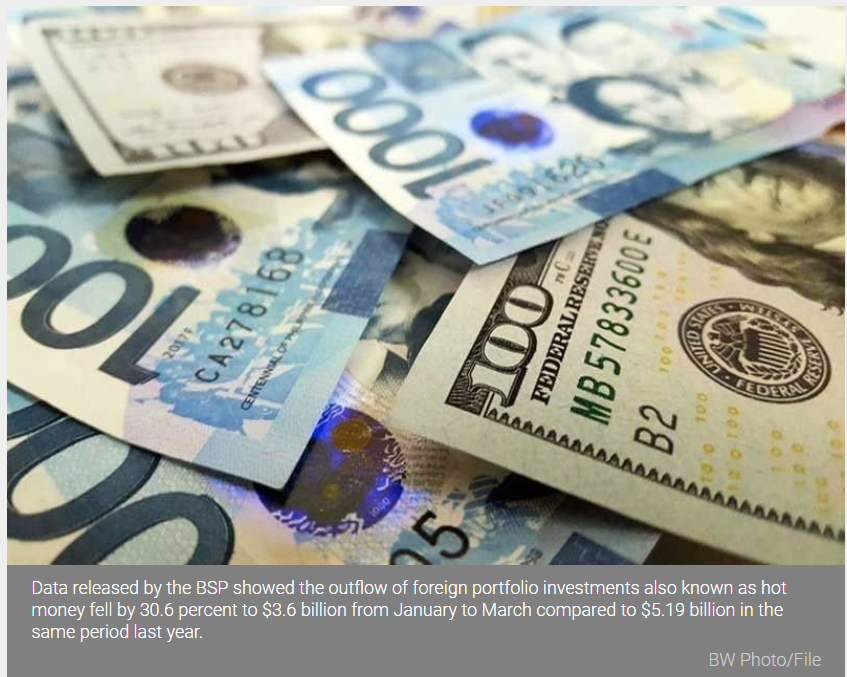Philippines: Better global outlook slows hot money exit
Outflow of speculative funds down to 67% in Q1
MANILA, Philippines — The net outflow of speculative funds invested in the Philippines slowed by 67.4 percent to $483.45 million in the first quarter amid the improving global economic outlook and the rollout of COVID-19 vaccines, the Bangko Sentral ng Pilipinas (BSP) said.
Data released by the BSP showed the outflow of foreign portfolio investments also known as hot money fell by 30.6 percent to $3.6 billion from January to March compared to $5.19 billion in the same period last year.
Likewise, the inflow of speculative funds declined by 15.9 percent to $3.11 billion from $3.7 billion.
Foreign portfolio investments refer to purely speculative funds that quickly and regularly move within the global financial markets as investors scout for higher short-term yields available.
For the first quarter, the BSP said transactions for investments in securities listed on the Philippine Stock Exchange (PSE) and other investment instruments resulted in net outflows, while investments parked in peso government securities yielded net inflows.
However, the Philippines continued to incur a net outflow in foreign portfolio investments amid the ongoing impact of the COVID-19 pandemic on the global economy and financial system.
“This has been accompanied by international and domestic developments such as the new US administration, vaccine rollout and the reimposition of additional quarantine measures amid the surge in virus infection,” the BSP said.
For March alone, the BSP said the net outflow of foreign portfolio investments fell by 43.7 percent to $540.97 million from $961.08 million in the same month last year.
Gross inflows coming mainly from the United Kingdom, US, Luxemburg, Switzerland and Hong Kong slipped by 13.6 percent to $824.23 million from $953.77 million.
The bulk or 90.5 percent of the total inflows went to PSE-listed securities particularly to banks, property companies, holding firms, food, beverage and tobacco companies as well as transportation services firms. The remaining 9.5 percent was invested in peso government securities.
Likewise, gross outflows declined by 28.7 percent to $1.36 billion in March from $1.91 billion in the same month last year. The US received 61.6 percent of the total outflows.
“Developments during the month included investor reaction to rising inflation and vaccine rollout amid the surge in virus infection and reimposition of restrictions on mobility in the NCR and nearby provinces,” the central bank said.
For this year, the BSP expects a net foreign portfolio investments inflow of $5.7 billion from a net outflow of $4.2 billion last year as the country is seen recovering from the pandemic-induced recession with a gross domestic product (GDP) growth of 6.5 to 7.5 percent.
The Philippines slipped into recession in 2020 with a record 9.6 percent GDP contraction, ending 21 years of growth.
Source: https://www.philstar.com/business/2021/04/30/2094704/better-global-outlook-slows-hot-money-exit


 Thailand
Thailand




